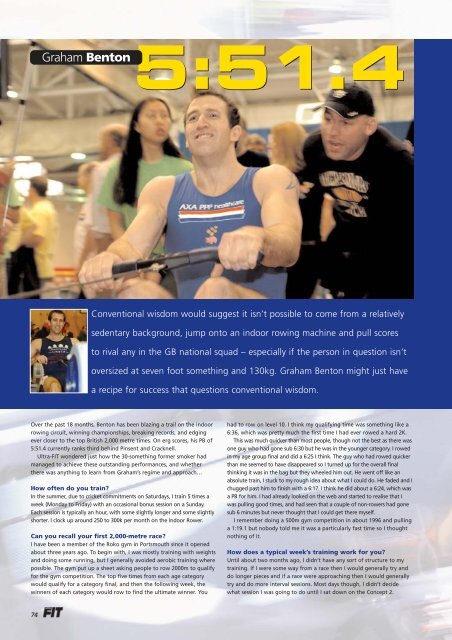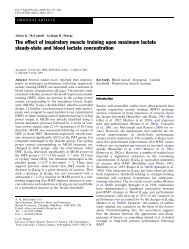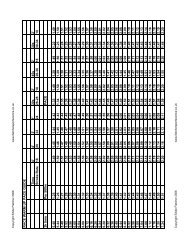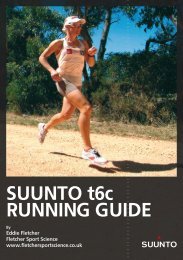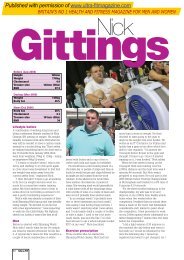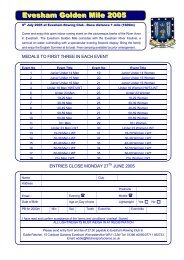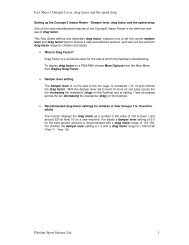to download pdf - Fletcher Sport Science
to download pdf - Fletcher Sport Science
to download pdf - Fletcher Sport Science
- No tags were found...
You also want an ePaper? Increase the reach of your titles
YUMPU automatically turns print PDFs into web optimized ePapers that Google loves.
Graham Ben<strong>to</strong>n5:51.4Conventional wisdom would suggest it isn’t possible <strong>to</strong> come from a relativelysedentary background, jump on<strong>to</strong> an indoor rowing machine and pull scores<strong>to</strong> rival any in the GB national squad – especially if the person in question isn’<strong>to</strong>versized at seven foot something and 130kg. Graham Ben<strong>to</strong>n might just havea recipe for success that questions conventional wisdom.Over the past 18 months, Ben<strong>to</strong>n has been blazing a trail on the indoorrowing circuit, winning championships, breaking records, and edgingever closer <strong>to</strong> the <strong>to</strong>p British 2,000 metre times. On erg scores, his PB of5:51.4 currently ranks third behind Pinsent and Cracknell.Ultra-FIT wondered just how the 30-something former smoker hadmanaged <strong>to</strong> achieve these outstanding performances, and whetherthere was anything <strong>to</strong> learn from Graham’s regime and approach…How often do you train?In the summer, due <strong>to</strong> cricket commitments on Saturdays, I train 5 times aweek (Monday <strong>to</strong> Friday) with an occasional bonus session on a Sunday.Each session is typically an hour, with some slightly longer and some slightlyshorter. I clock up around 250 <strong>to</strong> 300k per month on the Indoor Rower.Can you recall your first 2,000-metre race?I have been a member of the Roko gym in Portsmouth since it openedabout three years ago. To begin with, I was mostly training with weightsand doing some running, but I generally avoided aerobic training wherepossible. The gym put up a sheet asking people <strong>to</strong> row 2000m <strong>to</strong> qualifyfor the gym competition. The <strong>to</strong>p five times from each age categorywould qualify for a category final, and then the following week, thewinners of each category would row <strong>to</strong> find the ultimate winner. Youhad <strong>to</strong> row on level 10. I think my qualifying time was something like a6:36, which was pretty much the first time I had ever rowed a hard 2K.This was much quicker than most people, though not the best as there wasone guy who had gone sub 6:30 but he was in the younger category. I rowedin my age group final and did a 6:25 I think. The guy who had rowed quickerthan me seemed <strong>to</strong> have disappeared so I turned up for the overall finalthinking it was in the bag but they wheeled him out. He went off like anabsolute train, I stuck <strong>to</strong> my rough idea about what I could do. He faded and Ichugged past him <strong>to</strong> finish with a 6:17. I think he did about a 6:24, which wasa PB for him. I had already looked on the web and started <strong>to</strong> realise that Iwas pulling good times, and had seen that a couple of non-rowers had gonesub 6 minutes but never thought that I could get there myself.I remember doing a 500m gym competition in about 1996 and pullinga 1:19.1 but nobody <strong>to</strong>ld me it was a particularly fast time so I thoughtnothing of it.How does a typical week’s training work for you?Until about two months ago, I didn’t have any sort of structure <strong>to</strong> mytraining. If I were some way from a race then I would generally try anddo longer pieces and if a race were approaching then I would generallytry and do more interval sessions. Most days though, I didn’t decidewhat session I was going <strong>to</strong> do until I sat down on the Concept 2.74
I’ve now started <strong>to</strong> work with Eddie <strong>Fletcher</strong> who has given me aprogramme, which I am trying <strong>to</strong> stick <strong>to</strong>. At the moment it is generallylonger distance work focused at working at a particular heart rate <strong>to</strong>develop my aerobic fitness and power per stroke.It is generally rate-capped work, typically rating 20 – 24, but we will bedeveloping the higher stroke rates closer <strong>to</strong> the racing season. A normalweek would be 2 x 5000m with 5-10 minutes rest depending uponwhether it is a hard or easy week. The pace would be between 1:40 and1:46 depending upon hard or easy week as well. There are generally acouple of longer sessions, 2 x 30 minutes or 1 x 50 minutes steady state.Once a week I am also doing either 4 x 2500m or 3 x 3000m with 5mins rest at around 1:39. And additionally oneday a week, there is normally a session with avarying pace throughout the piece – 3 minutessteady, 1 minute hard, repeated eight times,and then the whole session repeated.The paces, heart rates and stroke rate are allvery specific and it has taken me some time <strong>to</strong>get used <strong>to</strong> the idea of not always going asfast as possible. Even so, my heart rate seems<strong>to</strong> be responding nicely and I pulled a 1:14.9500m very recently which is only 0.1 away frommy PB, was done out of race season and wasnot maximal effort. As Eddie would say, ‘Youdon’t need <strong>to</strong> train fast <strong>to</strong> go fast’.Do you do any special preparation asyou get close <strong>to</strong>wards race day?If I am racing on a Saturday, then I wouldnormally train for the final time on theWednesday evening. If the race is on a Sunday,then it would be Thursday evening. The finaltraining session is normally a 4 x 500m with 90seconds rest, trying <strong>to</strong> focus on each part ofthe race and the split I want <strong>to</strong> hold. So, hardsprint on the first one and settle in<strong>to</strong> my split.The middle two are both steady split pieces.And the final one would have a sprint finish. Other than that, I try andeat well in the final week, sleep as much as possible and make sure Itake plenty of Vitamin C and Echinacea <strong>to</strong> keep away illness!If it’s not a major secret, what race strategy do you adopt<strong>to</strong> get your big scores?I don’t think my strategy is anything of a secret – nor is it that complicated.I basically go off absolutely as hard as I can, aiming <strong>to</strong> hit sub 1:10 withinabout four strokes. I do a couple of strokes at this pace and then graduallydrift back up <strong>to</strong> my base split, which is the split I intend <strong>to</strong> sit on for mos<strong>to</strong>f the race. A base split of 1:30 will generally get me a 5:56/7 on thatstrategy. In Bos<strong>to</strong>n, I sat on 1:28/1:29’s and it got me the 5:51.4.I would aim <strong>to</strong> sit on this split, at around 34 spm, until 666m <strong>to</strong> go... anodd number I know but it’s a mental thing. It equates <strong>to</strong> 2 mins @ 1:30 soI know that I am in my zone then. Depending on what the situationrequires, I then gradually crank it up. I ease the split down until 300m,then look <strong>to</strong> kick down a couple of seconds per 500m, then with 150m <strong>to</strong>go I shorten the stroke and aim for around 1:20s.In reality, it’s a simple strategy – sprint, steady, sprint.What about mental preparation – do you tend <strong>to</strong> gooff <strong>to</strong> a corner and think about it, or get very psyched up‘in the arena’?Mental preparation is something I am working on at the moment. StuartMcSorley, an experienced triathlete who is now living in America, hasbeen helping me with the mental side of things and there is plenty ofwork <strong>to</strong> be done there. I get very nervous prior <strong>to</strong> a race but although itdoesn’t always seem so at the time, these nerves have always worked <strong>to</strong>my advantage. I tend <strong>to</strong> try and keep myself busy until the race is prettyimminent – chatting <strong>to</strong> people, watching the other racing, etc.Once I get changed and warm up then I try and focus a little more. Ihave a little notepad with some positives written down in there that Iread through, focusing my mind a little on past successes. I know this isan area I can improve and my times will come down as my self-beliefgets stronger. There is no reason why I shouldn’t have more self-belief asI have been very nervous before every race, even trying <strong>to</strong> get out ofracing just prior <strong>to</strong> some events. I rowed in Belgium and decided Iwouldn’t race... I just didn’t fancy it. I had gone there with a chap calledKev Peebles and he <strong>to</strong>ld me <strong>to</strong> s<strong>to</strong>p being stupid so I rowed <strong>to</strong> a steadyplan, but one of the other rowers got me interested and dragged mein<strong>to</strong> a race and I ended up PB’ing with a 5:54.3What goals do you have now on the water?That is a very difficult question <strong>to</strong> answer as the water rowing hasunfortunately taken a back seat lately. Istarted rowing at Molesey in November. Theywere excellent, accepting me straight away. Igot thrown in at the deep end by findingmyself sat in the middle of an Eight within 20minutes of arriving. This was a bit daunting asI have never even sat in a boat before and Ifelt that I was holding the other people up.The rest of the crew were all very patientthough, despite being considerably more ablethan myself. The standard of the coaching atMolesey was also excellent with Simon Cox andMartin Cross both giving me a lot of focus. Icontinued until about February when a coupleof indoor races and the World Championshipsmeant that I missed a few weekends, and Ididn’t get back in<strong>to</strong> it after that which is ashame. The main issue was the distance. I washaving <strong>to</strong> leave my house in Portsmouth at 6amat weekends <strong>to</strong> get <strong>to</strong> the club for 7.30am, andI found it difficult <strong>to</strong> get down there during theweek. I went <strong>to</strong> see Mark Banks at Leander acouple of years back and he said that theOlympics in 2008 could be a realistic goal. How Istand against that now, I really don’t know.Where I live makes it very difficult <strong>to</strong> put in anysignificant time on the water so unless that changes then I will have <strong>to</strong>accept that my success is going <strong>to</strong> be limited <strong>to</strong> the Concept 2.My 2k is going <strong>to</strong> get a lot quicker... Eddie has professionally testedme in the lab and is convinced that my best time is a lot quicker than5:51.4. I genuinely don’t see 5:50 as a barrier and hope <strong>to</strong> be around5:45 within the next 12 months. I’d like <strong>to</strong> think that then I could go on<strong>to</strong> make a challenge for Matthew Pinsent’s new British record.If I could learn <strong>to</strong> row then I would hope that I could transfer thison<strong>to</strong> the water but at the moment my water progress has stalled. I havenot given up on the idea by any stretch of the imagination but I am notsure how <strong>to</strong> move the situation forward. I’d be interested <strong>to</strong> know ifanyone had any suggestions as <strong>to</strong> where I can go from here.How difficult is the transition from indoor <strong>to</strong> water rowing?I’d be lying if I said I found it easy. Well, the physical side was quite easyas most of the guys in the boat were around a minute slower than meover 2K so I didn’t feel particularly taxed by the effort involved.However, a lot of that was because my technique was not goodenough <strong>to</strong> allow me <strong>to</strong> put significant power in<strong>to</strong> the stroke. I did findit difficult on certain parts of my body, but again that was down <strong>to</strong> mytechnique. The natural tendency is <strong>to</strong> grip the blade <strong>to</strong>o tightly so myhands and forearms would tire before the rest of me. It is an incrediblytechnical sport though, and I did find the technique difficult <strong>to</strong> grasp.Experienced rowers make it look so simple – like breathing. But I washaving <strong>to</strong> concentrate for every second of every stroke. I was worryingabout blade heights, depths, coming far enough forward, driving withthe legs, and feathering. At times, this made me feel like I was notenjoying it but I did get a real buzz when a session went well and I felt Ihad improved. Molesey row on a lovely bit of the Thames and I didenjoy the winter mornings, although getting out of bed did sometimesprove tricky. The main difficulty was that I was only getting <strong>to</strong> traintwice a week as a maximum and this made it very difficult <strong>to</strong> developany momentum and make rapid progress, which was frustrating.75


